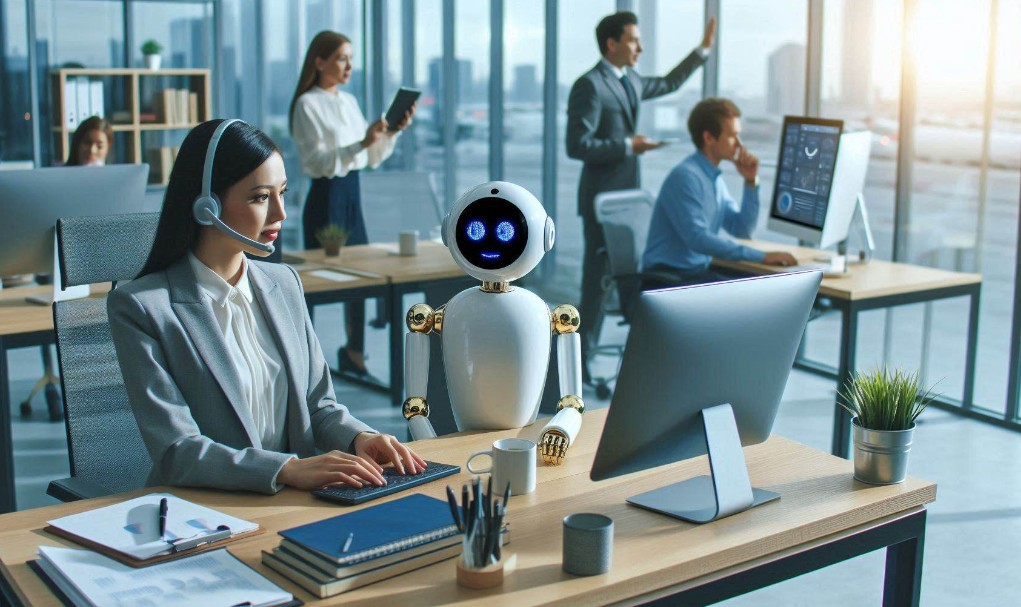In recent years, there has been a significant advancement in the field of Artificial Intelligence (AI) and Augmented Reality (AR). These technologies have become increasingly popular and have the potential to enhance virtual experiences in various fields such as gaming, education, healthcare, and...
AI in the Office as a Constant Helper Always on Call

In today’s fast-paced professional environments, workers increasingly rely on advanced technologies to optimize tasks and improve efficiency. With digital advancements transforming nearly every industry, smart systems and tools are now integral to daily operations. These intelligent solutions provide essential support in decision-making, communication, and repetitive processes.
Artificial intelligence has evolved beyond just a trend, becoming a key factor in reshaping how teams collaborate and achieve goals. Whether it’s managing schedules, automating mundane tasks, or enhancing communication, AI-driven solutions are now at the forefront of workplace productivity. These systems offer personalized assistance, adapt to individual workflows, and provide valuable insights that help professionals make informed choices.
As AI technology continues to advance, its potential to change workplace dynamics becomes more evident. The seamless integration of these tools is revolutionizing work habits, allowing businesses to stay competitive while enhancing employee satisfaction. AI’s role is shifting from being just a tool to becoming a trusted companion in professional settings, streamlining processes, and boosting overall performance.
How AI Enhances Office Efficiency
In modern work environments, efficiency is more than just completing tasks quickly–it's about achieving maximum productivity with minimal effort. With the integration of artificial intelligence, workflows are optimized and repetitive processes are automated, allowing professionals to focus on more strategic and creative responsibilities. These advancements in AI technology are drastically improving how teams and individuals work, leading to smarter and faster decision-making.
Streamlining Administrative Tasks
AI-driven tools are revolutionizing time-consuming administrative duties. From scheduling meetings and organizing emails to managing documents, these systems can take over mundane tasks that would otherwise drain valuable time. By automating repetitive actions, employees can redirect their attention to more critical aspects of their roles, improving overall productivity.
Improving Data Management and Analysis
Data analysis is another area where AI shines. With its ability to process vast amounts of information in real time, AI can quickly identify trends, generate reports, and offer actionable insights. This enables businesses to make data-driven decisions faster, which leads to more effective strategies and a competitive edge. Advanced AI algorithms can even predict future trends, further empowering professionals to stay ahead of potential challenges.
AI Tools That Streamline Daily Tasks
With the growing demand for efficiency, many professionals are turning to AI-powered tools to simplify everyday operations. These digital assistants are designed to automate routine activities, helping individuals and teams save time and reduce manual errors. By taking over mundane chores, AI solutions free up employees to focus on more value-driven projects, boosting productivity and enhancing workflow consistency.
Task Management and Scheduling
AI systems can significantly improve time management by automating scheduling and organizing tasks. These tools not only arrange meetings but also prioritize urgent tasks, offering personalized recommendations based on individual preferences and deadlines. By analyzing patterns and optimizing calendars, AI solutions ensure that important activities are completed on time, avoiding conflicts and minimizing missed opportunities.

Content Creation and Communication
Generating written content and maintaining communication is another area where AI tools excel. AI-powered writing assistants help with drafting emails, reports, and presentations, ensuring proper grammar and style. Moreover, chatbots and virtual assistants enable instant communication, addressing customer inquiries or internal queries without delay. This streamlines both internal and external interactions, making work processes more fluid.
AI Tool Function Benefit
| Scheduling Assistant | Automates calendar management and meeting scheduling | Saves time, reduces conflicts |
| Writing Assistant | Helps draft emails, reports, and presentations | Improves writing quality and reduces errors |
| Virtual Assistant | Handles communication and customer inquiries | Enhances response speed and efficiency |
The Future of AI in Workplace Productivity
As artificial intelligence continues to evolve, its influence on productivity in professional environments will only grow stronger. In the coming years, AI systems will become more integrated, more intelligent, and more capable of handling complex tasks that were once exclusive to humans. With advancements in machine learning and natural language processing, AI will be able to anticipate needs, adapt to various workflows, and provide support in ways we haven't yet imagined.
Future innovations promise to redefine how teams collaborate, decision-making processes unfold, and how work is structured. AI will not only enhance individual performance but will also allow businesses to create more agile, efficient, and responsive environments.
Key Trends Shaping AI's Future Role
- Increased Automation: More tasks, from scheduling to data analysis, will be fully automated, enabling employees to focus on strategic and creative endeavors.
- Personalized Assistance: AI systems will become more attuned to individual preferences and working styles, providing tailored support that boosts personal and team productivity.
- Enhanced Collaboration: AI will facilitate seamless collaboration across teams, automating project management, improving communication, and ensuring smooth execution of cross-functional tasks.
- Real-Time Decision Making: AI-powered insights will assist in making faster, data-driven decisions, improving response times to market changes or customer demands.
Potential Challenges and Opportunities
While AI holds immense promise, it also presents challenges that will need to be addressed. Companies will need to manage the ethical implications of AI in the workplace, including privacy concerns and potential.



